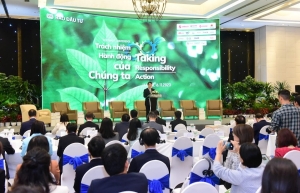Vietnam concocts plan for cooling
At a consultation workshop on the issue on November 9, technical expert Nguyen Tien Hai offered an assessment and projections of growth in the cooling sector in Vietnam.
“This was a major energy consumption area in 2022, accounting for one-quarter of the total energy consumption of the country. The total number of air-conditioners in Vietnam reached over 20.7 million, and this is expected to reach 75 million by 2050,” Hai said.
 |
| Bulding a robust cooling action plan will help tackle issues such as greenhouse gas emissions, Photo: Shutterstock |
The workshop was co-organised by the Department of Climate Change under the Ministry of Natural Resources and Environment (MoNRE), the United Nations Office for Project Services, and the Southeast Asia Energy Transition Partnership.
The consultant units are to conduct an in-depth study and survey to assess the current state of the cooling sector, including the technology available, market status, and to stocktake both international and national policies.
Based on such analysis, through this assignment, proposals will be made to develop the National Green Cooling Action Plan (NGCAP) to promote conversion to high-energy efficiency and low carbon technologies, and increase energy savings in the sector.
The schedule to build NGCAP combines three periods. The first phase is an assessment of the current situation and the development of a plan, and the second phase is an assessment of demand, which includes the assessment of the current and future demand per sector and suggestions tailored to each. In the third phase, the parties will complete and develop NGCAP report and implementation guidelines.
According to the MoNRE, Vietnam is undergoing rapid urbanisation due to the drastic increase in the population. Besides that, the extreme heat also adds to the demand for cooling. Food security also raises the demand for refrigeration in terms of cold chain logistics and infrastructure.
The development of the NGCAP will assess and reflect the effects of increasing cooling activities and reducing GHG emissions on vulnerable groups, ensuring an inclusive and gender-balanced approach.
“This development will align with Vietnam’s latest GHG emissions targets and commitment to the net-zero target by 2050, ensuring that the proposed strategies and interventions are consistent with the country’s goals,” added Hai.
Nguyen Dang Thu Cuc, deputy head of the GHG Emission Reduction and Ozone Layer Protection Division under the MoNRE said, “The result of in-depth study and survey will be the basis for not only building NGCAP, but also be important data for the ministry to develop a plan to eliminate substances that deplete the ozone layer and cause the GHG effect.”
The MoNRE recommends that to establish an effective NGCAP, it needs the integration of both active and passive cooling. It clarified specific measures to promote active cooling within the NGCAP. Accordingly, the government can implement incentive policies to encourage businesses and individuals to use highly energy-efficient cooling equipment and systems.
The ministry added it is necessary to enhance the design and construction of green buildings, and the government needs to support businesses and individuals in constructing green buildings that incorporate passive cooling solutions. In addition, it also needs natural solutions such as green roofs, while urban landscaping can help reduce the urban heat island effect and create more comfortable outdoor spaces.
 | Vietnam embraces green growth in its sustainable development strategy for 2023 At the Sustainable Development 2023 seminar, Deputy Minister of Planning and Investment Tran Quoc Phuong outlined Vietnam's commitment to green growth and sustainable development, highlighting the challenges and strategies in the new era. |
What the stars mean:
★ Poor ★ ★ Promising ★★★ Good ★★★★ Very good ★★★★★ Exceptional
Related Contents
Latest News
More News
- Trung Nam-Sideros River consortium wins bid for LNG venture (January 30, 2026 | 11:16)
- Vietnam moves towards market-based fuel management with E10 rollout (January 30, 2026 | 11:10)
- Envision Energy, REE Group partner on 128MW wind projects (January 30, 2026 | 10:58)
- Vingroup consults on carbon credits for electric vehicle charging network (January 28, 2026 | 11:04)
- Bac Ai Pumped Storage Hydropower Plant to enter peak construction phase (January 27, 2026 | 08:00)
- ASEAN could scale up sustainable aviation fuel by 2050 (January 24, 2026 | 10:19)
- 64,000 hectares of sea allocated for offshore wind surveys (January 22, 2026 | 20:23)
- EVN secures financing for Quang Trach II LNG power plant (January 17, 2026 | 15:55)
- PC1 teams up with DENZAI on regional wind projects (January 16, 2026 | 21:18)
- Innovation and ESG practices drive green transition in the digital era (January 16, 2026 | 16:51)

 Tag:
Tag:
















 Mobile Version
Mobile Version